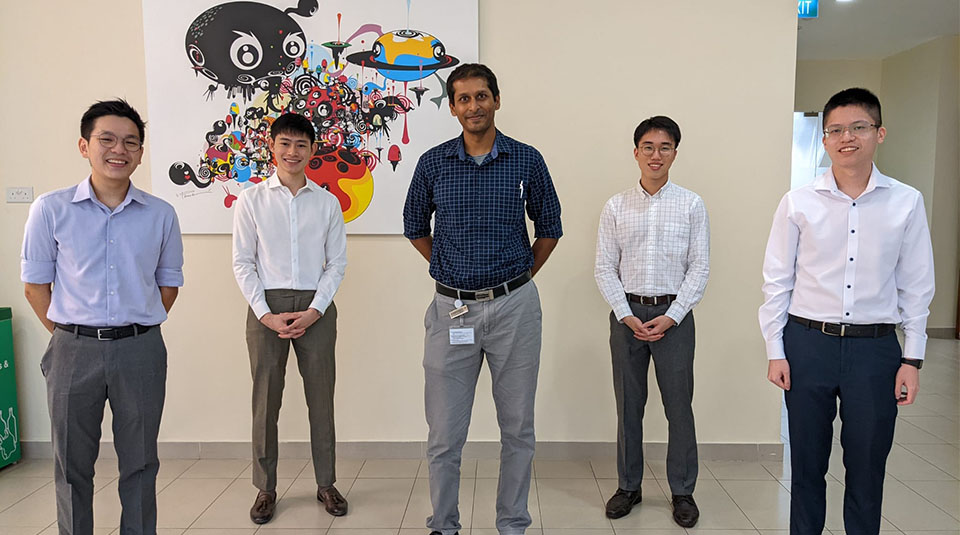NUS Medicine students and researchers develop novel algorithm to assess immunotherapy benefit in stomach cancer patients
Published: 14 Dec 2021

[Clockwise from left] Dominic Yap, Joseph Zhao, Assistant Prof Raghav Sundar, Benjamin Tan and Teo Chong Boon [Photo Credit: Assistant Prof Raghav Sundar]
Immunotherapy is a new class of drugs that have shown significant benefit in some cancer types. It redirects the body’s own immune system to target cancer cells in the body, harnessing the body’s innate ability to distinguish between cancer and healthy cells. Recent clinical studies indicate that patients with stomach cancer treated with a combination of immunotherapy and chemotherapy have a higher survival rate compared to those who were treated with chemotherapy alone.
However, it was found that not all patients benefit from a joint immunotherapy-chemotherapy treatment.
A team consisting of three fifth-year medical students, Joseph Zhao, Teo Chong Boon, Benjamin Tan, and one third-year medical student, Dominic Yap, led by Assistant Professor Raghav Sundar, Consultant from the Department of Haematology-Oncology at the National University Cancer Institute, Singapore, and the Department of Medicine at NUS Medicine, identified a group of stomach cancer patients who may not benefit from undergoing joint immunotherapy-chemotherapy treatment, using a novel algorithm they developed on their own.
The algorithm, called KMSubtraction, was validated with over 500,000 simulations to demonstrate its robustness and explore its limits of error. The implementation of KMSubtraction in these trials resulted in new findings confirming that more than 20% of the patient population will not benefit from the addition of immunotherapy into chemotherapy regimen.
The impetus for this algorithm came about when a recently-conducted Phase III randomised controlled trial –CheckMate-649– demonstrated that the addition of immunotherapy to conventional chemotherapy provides patients with advanced gastro-esophageal cancer a significant chance of survival. A protein biomarker, known as PD-L1, has been hypothesised to be an indicator that can identify patients who may respond well to immunotherapy, along with conventional chemotherapy. This protein biomarker is commonly found on the tumour cells and the immune cells around the tumour. Patients with higher indicators of PD-L1 have been observed to derive more benefits from immunotherapy.
The authors of the CheckMate-649 clinical trial reported that patients with the biomarker score of more than 1 or more than 5 showed a high survival rate when treated with a combination of immunotherapy and chemotherapy. This manner of reporting meant that clinicians were unable to tell if patients with the biomarker score between 1 to 4 would truly benefit from immunotherapy-chemotherapy treatment.
The implementation of KMSubtraction in these trials confirmed that more than 20% of the patient population will not benefit from the addition of immunotherapy into chemotherapy regimen. This finding means that such patients can potentially be spared unnecessary treatment side effects as well as high treatment costs.
More details can be found in the press release here.

